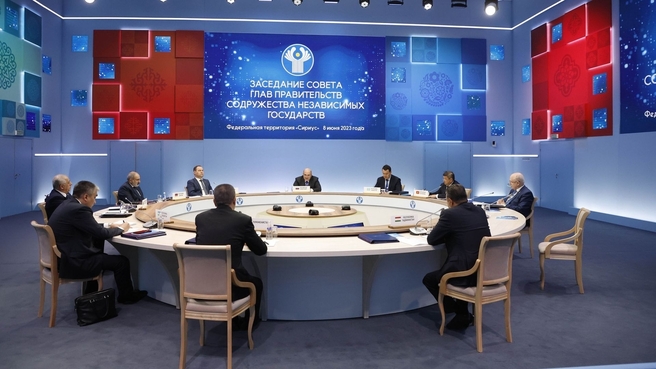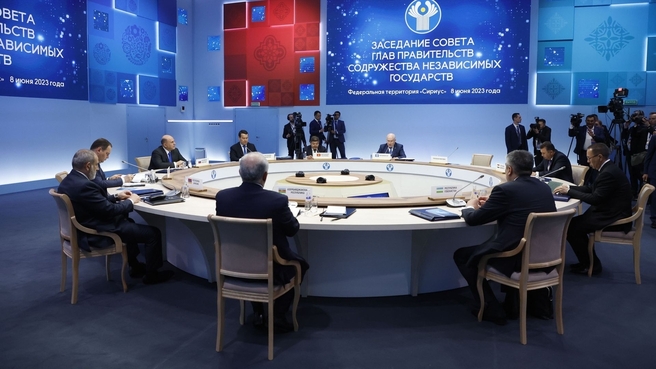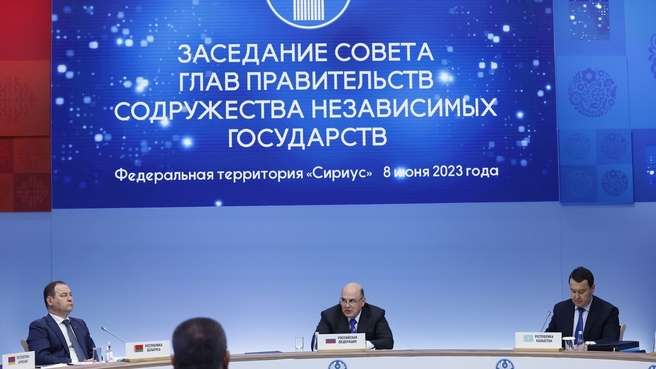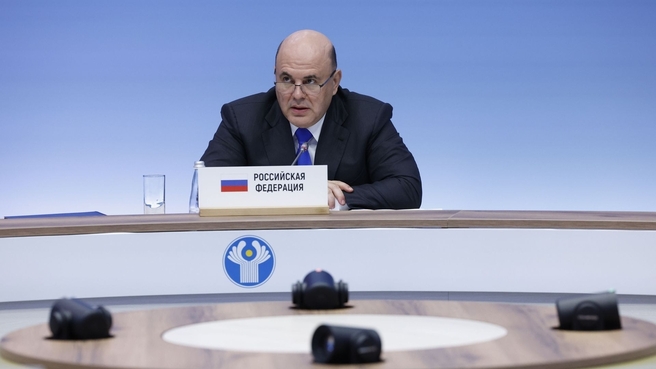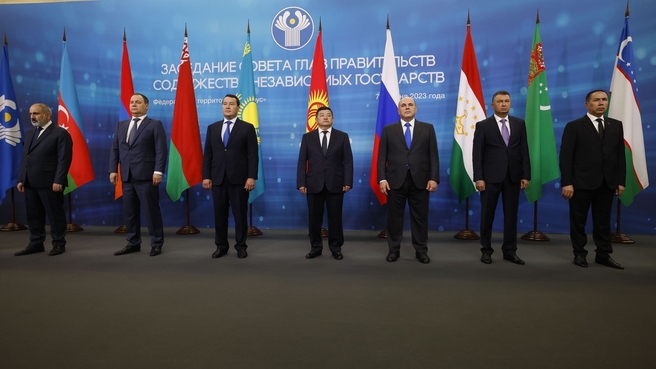Heads of delegations taking part in CIS Heads of Government Council meetings
Prime Minister of the Republic of Azerbaijan Ali Hidayat oglu Asadov;
Prime Minister of the Republic of Armenia Nikol Pashinyan;
Prime Minister of the Republic of Belarus Roman Golovchenko;
Prime Minister of the Republic of Kazakhstan Alikhan Smailov;
Prime Minister of the Kyrgyz Republic, Chief of Staff of the Presidential Executive Office of the Kyrgyz Republic, Chairman of the CIS Heads of Government Council Akylbek Japarov;
Prime Minister of the Russian Federation, Chairman of the Eurasian Intergovernmental Council Mikhail Mishustin;
Prime Minister of the Republic of Tajikistan Kohir Rasulzoda;
Deputy Prime Minister of Turkmenistan Hojamyrat Geldimyradov;
Ambassador Extraordinary and Plenipotentiary of Uzbekistan to the Russian Federation Botirjon Asadov;
Secretary-General of the Commonwealth of Independent States Sergei Lebedev.
Mikhail Mishustin’s remarks:
Mr Japarov, Dear friends, Colleagues,
We are delighted to welcome you to hospitable Sochi, Russia’s summer capital.
Trip
-
Restricted meeting of the Eurasian Intergovernmental Council
-
Mikhail Mishustin's meeting with Armenian Prime Minister Nikol Pashinyan
-
Mikhail Mishustin’s meeting with Prime Minister of Belarus Roman Golovchenko
-
Mikhail Mishustin’s meeting with Prime Minister of the Republic of Cuba Manuel Marrero Cruz
-
Mikhail Mishustin addresses opening ceremony of 2nd CIS and EAEU Youth Forum
Thank you for accepting our invitation. I am confident that the unique atmosphere of this resort city will be conducive to constructive and productive communication.
I would like to emphasise once again that Russia is sincerely interested in strengthening intra-CIS collaboration still further.
In the past three decades,
we have established a solid regulatory framework in the trade and economic area,
and importantly, in the socio-humanitarian area, which directly affects the interests of all the people in the member countries.
Mikhail Mishutin’s remarks at the meeting:
Mr Zhaparov, colleagues, friends,
In late 2022, St Petersburg hosted an informal CIS summit, during which President of Russia Vladimir Putin emphasised that deepening our interaction within the CIS meets the fundamental interests of all our nations and helps deliver on social and economic development objectives, while also reinforcing regional stability.
It is our belief that we need to use all the possibilities we have at our disposal to expand trade and economic cooperation. We have a wealth of natural resources and human capital. Together, we strive to promote cooperation and develop manufacturing on our own. We create new jobs. During today’s visit to the exhibition, we had a detailed review of the joint cooperation projects, among other things.
Our economies are intertwined. To achieve even more, we need to ensure that decisions we take within our countries and at the Eurasian level are in sync. This way, we can ensure that integration frameworks develop on a sustainable footing in the new reality.
These are challenging times for the global system of trade. Our Western colleagues have been seeking to preserve the world order as they deem fit by stepping up pressure on countries who are committed to independence and choose to follow their own development path.
In particular, Russia faces an unprecedented number of sanctions. However, this has not resulted in a drop in trade with its CIS partners. In fact, trade increased 6 percent in 2022, and this positive momentum has been continuing to this day.
We can consolidate this trend by working together.
If what happened over the past several months is any guide, we must focus on our internal capabilities as well as keep up our close contacts while reinforcing our technological and, of course, economic independence.
Russia and many other countries increasingly trade in their national currencies with over 80 percent of all transactions across the Eurasian Economic Union space carried out this way.
We need to fast-track the transition to an alternative settlement framework within the CIS that would not depend on the dollar and the euro. Among other things, we must do this to create a new decentralised global financial system. As President of Russia Vladimir Putin has said, this would make the entire global economy, as well as settlements, more secure.
Today, we will be signing an agreement on free trade in services, initiating, operating and carrying out investment. We have spent over 10 years discussing it and have now left all the issues behind. This document will operate alongside the treaty for the free trade in goods, offering a powerful impetus to cooperation and creating new opportunities. It will create incentives for raising capital and creating jobs. Compared to bilateral instruments, this agreement provides a more developed framework for protecting investors’ rights and state interests.
Services account for over a half of the gross domestic product in CIS countries. This indicator has been growing and will keep increasing moving forward.
According to certain estimates, this landmark integration document will bring about an increase of more than 5 percent in overall exports of services, while imports are expected to add 3 percent. This will help create a favourable investment climate within the CIS, while including services in the CIS free trade area will be a major step towards strengthening regional integration.
We suggest stepping up industrial cooperation.
Let me reiterate that during our visit to the Eurasia – Our Home exhibition, we saw good examples of effective cooperation in various sectors, including energy, finance, transport, logistics, food security, digital transformation, tourism, sports, education, and healthcare. And the list goes on. This cooperation includes Russian entities, as well as companies from the CIS, the Eurasian Economic Union and observer countries, and also other important trade and economic partners. Companies from Belarus, Armenia, Uzbekistan, Cuba and Kyrgyzstan have been showing a lot of interest.
This event offers a great platform for showcasing integration projects, which have emerged as an important step towards strengthening our autonomy vis-a-vis foreign solutions.
Today, one of the main tasks for any state consists of achieving technological sovereignty.
This is a policy priority as far as Russia is concerned. We have been making strides in mastering the manufacturing of certain components to replace imports. We are also devising alternative logistics channels with an eye on export markets, among other things. Here too, we stand ready to engage in serious dialogue with our partners.
The effort to promote deeper interactions will enable us to be more effective when it comes to delivering on our economic development agenda and neutralising negative external factors. For this, it is essential that we launch cooperation chains and work together to produce goods that we used to source from the West, while removing transport and logistics barriers, as well as anything standing in the way of financial flows.
This is the purpose of the Industrial Cooperation Development Concept and the corresponding Package of Measures for the next eight years. Today, we will review these documents. We are ready to support them.
It is our hope that fulfilling this concept will lay the foundation for the emergence of new high-technology sectors and accelerate modernisation in manufacturing. This will also create new jobs. In addition, we will make the goods we produce more competitive and relevant.
Countries of the collective West seek to use CIS countries against Russia and to counterbalance Russia. They promote cooperation on unequal terms, including in information technology and security. We ask that all decisions in this regard be carefully weighed when defining international priorities.
These past few months have demonstrated in all clarity that we cannot rely on Western companies as hardware and software suppliers. They can block access to these supplies in no time, for sheer political reasons. It is for this reason that we need to work together to build up our own capabilities in this sphere and move swiftly to start making the goods our businesses and people need by ourselves.
Colleagues, friends,
Our multilateral dialogue serves as a powerful instrument for strengthening the international standing of the CIS and securing better terms for supplying goods to external markets. Most importantly, it helps improve the quality of life for our people.
